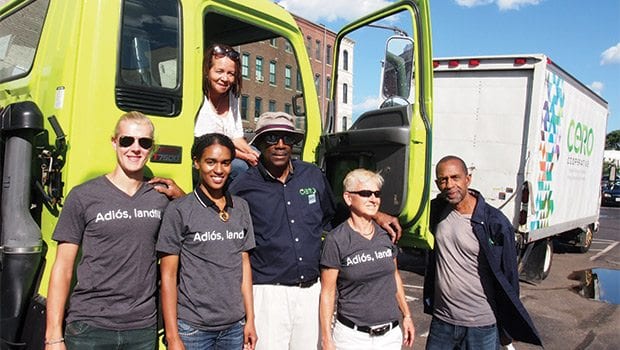Closing the food loop: A compost firm grows
CERO helps local farms produce healthy vegetables

Every day as tons of Boston’s food waste gets hauled off to landfills, two garbage haulers with the acronym CERO divert a small portion to a farm in South Hamilton. There, microbes do the hard work of breaking down orange peels, onion skins and wilted lettuce into compost. After a year of microbial digestion, the CERO trucks return, load up and bring that compost to Boston farms, which in turn supply local consumers with fresh vegetables.
Monday worker-owners with CERO (Cooperative Energy, Recycling and Organics) led community members on a tour of two restaurants and a farm that illustrate the impact of their work.

Vegetables growing in this Thornton Street plot, operated by Haley House and the Hawthorne Youth and Community Center, end up on pizzas served at Dudley Dough.
“We’re part of a bigger food-centered economic loop,” said Lor Holmes, who leads venture development and capitalization strategies for the Dorchester-based worker-owned coop.
Starting at the Haley House Café in Dudley Square, Holmes and her co-workers showed off three newly-purchased trucks used to pick up food scraps from the restaurants, hospitals, grocery stores and schools that pay them for the service of disposing of organic waste. In exchange for separating their food scraps from non-organic waste, the restaurants are able to pay far less than they would to commercial waste hauling firms.
On Thornton Street in the Highland Park section of Roxbury, Haley House and Dudley Dough staff led a tour of the community garden where they and teens working with the Hawthorne Community Center grow and harvest fresh vegetables that are then used at the restaurants.
On Washington Street near Shawmut Avenue, members of Alternatives for Community and Environment showed the group one of the five community farms they run using CERO-provided compost. Together, the farms produce approximately 2,000 pounds of produce, which is distributed among the community members who grow them.
Finally, back at Dudley Dough, a pizza shop in the Bolling Building, the tour group feasted on pizza topped with fresh produce harvested from the Thornton Street farm. Those uneaten pizza crusts dumped in the shop’s compost receptacle? CERO will pick them up.
“It’s great,” said Manager Luther Pinkney. “We’re able to get all our basil from the farm, which is big, because basil is in everything we make.”
Pinkney said the farm’s eggplant also finds its way onto their pizzas and its kale is consumed in their kale smoothies.
Cooperative ownership
CERO has its roots in the Boston Workers Alliance, a group founded by former City Councilor Chuck Turner to help local residents find employment opportunities. With the economic downturn in 2008 leading to a tight job market, activists with BWA turned to the green economy, first starting a firm called Roxbury Green Power, which specialized in converting waste oil from restaurant fryers into vegetable oil-based fuel. But with tight competition from larger commercial firms, the activists turned instead to compost.
The workers founded CERO as a worker-owned cooperative as a way to keep profits in the community.
“By having workers in the role of owners, we’re bringing down the antiquated structure where a few people make decisions for the many,” said Maya Gaul, one of the firm’s worker-owners. “We’re asking people to educate themselves and determine their own fate. I think that’s really cool.”
CERO kicked off in 2012 with a grant from the Barr Foundation, then launched an Indiegogo campaign to crowdfund their idea. The workers then turned to Boston Impact Initiative, an investment fund aimed at reducing economic inequality in Eastern Massachusetts, for a $275,000 investment.
“For our investment criteria, they hit the sweet spot,” said Deborah Frieze, co-founder and managing partner of the initiative. “They’re worker-owned, grassroots, stepping into economic democracy and building assets in their own community. And it’s green jobs.”
CERO followed that investment with a direct public offering – an investment tool that allows firms to offer stock to investors without going through a brokerage firm. Through that tool, investors pumped $340,000 into the firm.
An uncommon approach
Worker-owned coops like CERO are relatively rare, with only 400 thought to exist in the United States and no more than 20 in Massachusetts, according to Stacey Cordeiro, a consultant who works with the Boston Center for Community Ownership.
Cordeiro, who helped CERO structure their coop, said the firm stands out because it is worker-led.
“There are a lot of coops that are built to help low-income people, but they’re not often built by low-income people,” she said.
So far, CERO has built up a clientele of 20 customers who pay them to haul away food waste. But the coop worker-owners say they have plans to continue to grow the business.
The coop is in the process of getting state certification as a minority- and woman-owned business. Five of the eight CERO worker-owners are black or Latino and five are women. The state certification will give the group an edge when competing for city and state contracts, like schools and correctional facilities.
The group also plans to create an anaerobic composting facility – a place where composting happens in sealed containers – that would allow them to process more food waste in Boston.
But the coop isn’t waiting for those new developments to generate new business. They’re marketing their service to any food waste-generating business that will listen. And they’re getting bites.
“We just picked up five new contracts,” Gaul said. “And we’re always looking for more.”







